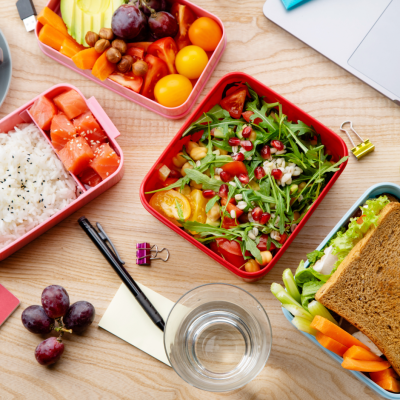The 3 food trends changing our workplaces for the better
Office food options have been through a big change as organisations look for ways to attract talent back into the workplace.
Carefully curated kitchens full of fresh, nutritious food are here to stay as employers realise they now have to “earn the commute” after a pivot to hybrid work.
We look at the three food trends changing Australian workplaces for the better:
1. The rise and rise of healthier food
The days of stale biscuits in an old tin next to the instant coffee are over.
Employees want healthier food while at work. In fact, the level of office snacks and meals is being used as a big point of difference in the fight for talent, according to Nutrition Australia (Vic, SA, TAS, WA) CEO Lucinda Hancock.
Hancock has seen well-stocked kitchens help lure people back to the office. “Let’s face it, we all want our boss to incentivize us to come into the office,” she says.
“The workplace has an incredible opportunity to provide nutritious snacks. Now more than ever, people want healthier alternatives instead of the celebratory-style options we saw in workplaces years ago.”
“A well-stocked office kitchen is helping employers earn the commute in a tight labour market as people push to be able to continue working from home, at least part of the week.”
This trend has led forward-thinking employers to spend more time considering what their food offering should look like.
That means the soft drink machine is being swapped for healthier drink offerings, and almond and soy milk sit alongside cow’s milk to ensure all tastes and dietary requirements are met. Fruit bowls are full of what’s in season and there’s a range of yoghurts in the fridge.
We’re seeing workplaces offer premium, organic food packaged in sustainable and eco-friendly packaging,”
Lucinda Hancock, CEO, Nutrition Australia, (Vic, SA, TAS, WA).
“Great food can boost productivity and make the workplace a place to come together to celebrate our achievements.”
Of course, even within this healthier-eating trend, office birthday cakes and other sweet treats will remain popular from time to time.
2. The good food movement
When it comes to our food, the more local it is, the better. We want to know where the apples in the fruit bowl were grown and who made the hummus in the fridge.
We want sustainable, locally sourced food that will fill us up with good nutrients and keep us going for the entire working day.
We also want to know that food waste is dealt with in a sustainable way. This has seen some workplaces connect with local charities to ensure that unused food isn’t wasted.
Sustainably sourced coffee in eco-friendly packaging is also a must. You might even want to add a smoothie maker to the kitchen!
Along with better meals and snack choices, workplaces should look to provide decent storage for snacks brought from home, along with spacious, well-designed and well-resourced food preparation areas, including enough utensils and plates.
3. Free feels good
There’s no doubt that the offer of a company-provided free meal or two during the working day is a particularly sweet benefit these days, given that the cost of living is on the rise.
“Housing is eating into the weekly budget to such an extent that there are lots of families who have to think twice about what they put in their supermarket trolley each week because they have to cover the cost of the mortgage,” Hancock says.
‘Free’ is also a great motivator to return to the office. A free breakfast is a positive start to the day; it makes us all feel cared for and appreciated.
If you’re a budget-conscious employer, you might want to introduce free breakfasts or lunches on specific days of the week.
The office food offering is also helping HR departments when recruiting new hires, with a premium selection helping organisations attract the best in the business.
Employers that have downsized their office space have even funnelled the savings into a better stocked kitchen for their people.
Of course, from a practical standpoint, offering your employees an improved eating experience shouldn’t become an organisational burden. Hancock recommends that organisations spend time setting up a routine where business food and drinks are regularly ordered from a reliable partner so restocking is simple and efficient.
“Once you’ve started improving the office kitchen, you’re going to need to make it easy for yourself to continue restocking throughout the year,” she advises.



